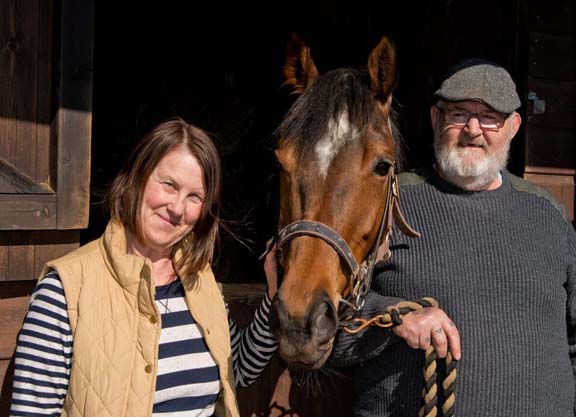“Dark Horse: The Incredible True Story of Dream Alliance” is and isn't a horse racing movie. It is because it chronicles the career of a poorly bred English steeplechaser named Dream Alliance (Bien Bien) who overcame the many odds against him to become a top-class horse. It isn't because the better story is really that of the 23 working-class people from a small, down-on-its-luck village in Wales who bred and raced the horse, motivated by the impossibility of their task. They did what they did because no one thought it could be done.
Jan Vokes was a cleaner at a local grocery store and a barmaid at a “working men's club” in her home in the village of Cefn Fforest who wanted something more out of her life. She had overheard a customer at the pub named Howard Davies talk about his experience running a small horse syndicate. Though Davies's group had lost money, Vokes was intrigued. She knew nothing about racing and didn't have the money to get involved on any meaningful level, but decided to plow into a sport that traditionally had no place for people with her background and economic situation.
She would breed a racehorse. Why? Why not?
So she bought a mare named Rewbell, a dismal failure on the racetrack, whose owner let her go for £300. Next, she needed someone with some racing knowledge to set the wheels in motion and convinced Davies to put together and run another syndicate. They found members by posting a sign in the club, offering people a chance to own a racehorse. Their only financial commitment would be to put up £10 a week for as long as the horse raced.
Davies chose the sire, Bien Bien, not because he was a four-time Grade I winner on the flat in the U.S. but because his stud fee of £3,000 was all they could afford. The mating produced a gangly foal of 2001, a chestnut with four white stockings they would name Dream Alliance.
Dream Alliance was turned over to trainer Philip Hobbs, who is still active. Hobbs never appears in the movie, so the question of why an established trainer would take on what appeared to be such a seemingly hopeless horse is never answered.
But it turns out that Dream Alliance was anything but hopeless. While his form was erratic, on his best day he could compete favorably against some of the best horses in the sport. In 2007, he finished second in the Hennessy Gold Cup at Newbury.
All good movies need a plot twist and that came in a race on the undercard of the 2008 Grand National. Dream Alliance severed a tendon during the running and it was feared that he would have to be put down. The syndicate members were told that there was a possibility that he could be nursed back to health through stem cell surgery, but it would cost £20,000 and even if it worked, the only guarantee was that Dream Alliance would have a better quality of life upon retirement. Though most could not afford to pay their share of the surgery, they agreed to do so.
Dream Alliance not only returned to good health but returned to competition, and was better than ever. The crowning achievement of his career came in 2009 when he won the Welsh Grand National at odds of 20-1. With the win came media attention with one newspaper coming up with the headline “Slumnag Millionaire” for a story on Dream Alliance.
In 2010, Dream Alliance raced in the Grand National itself. But he didn't make the course and would never again so much as finish in the money. He was retired in 2012 with a record of 5 wins from 30 starts and earnings of 137,000.
“'Dream' took us to places you couldn't even imagine,” Davies said. “There we were going to Aintree for probably the greatest race on the planet. We actually broke the mold. We actually went there and did it and did it for a 'tenner' a week. It's elating when you can do something, particularly when no one gives you a chance.”
And that's what this movie is really all about. British steeplechase racing is the perfect villain. It is an oligarchy and people from a poor town in Wales suffering through desperate times due to the collapse of the mining industry are not supposed to be welcome–let alone succeed.
“I knew nothing about racing,” Vokes said. “I did know these well-to-do people like to keep the sport to themselves.”
Prior to Dream Alliance's first start, one syndicate member is told by a guard at the entrance of Newbury that he can't bring the brown-bag lunch he had brought with him into the racecourse. He had packed his own sandwich and lager because he didn't feel he could afford the overpriced racetrack fare.
Dark Horse was released in the U.K. last year amid favorable reviews. Here, it won the Audience Award in the World Cinema Documentary Competition at the 2015 Sundance Film Festival. It will open in theaters in New York and Los Angeles on May 6, the day before the GI Kentucky Derby. A week later, it will appear in several U.S. cities, Louisville among them.
This plucky group proves that what it really takes to succeed is not a trust fund or the words “Lord” or “Sir” before their first names, but an indomitable spirit. Some might see that as a cheap shot toward racing, but it's also what makes the movie work. It a sweet story of an over-achieving horse and owners who are nothing short of racing's version of Rocky.
Not a subscriber? Click here to sign up for the daily PDF or alerts.






